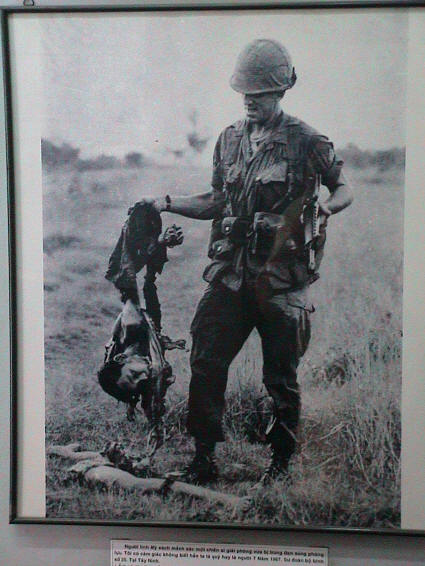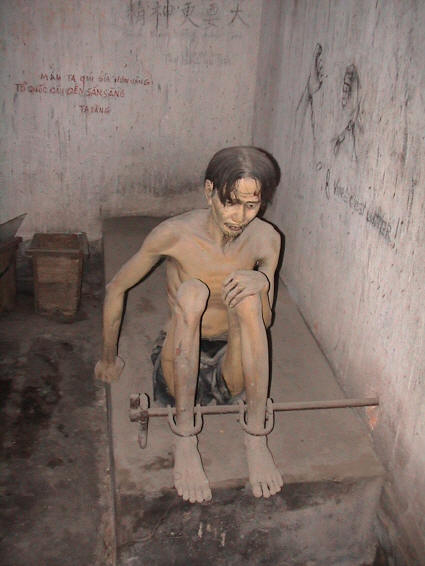Defending Jane Fonda
Recent hate articles about Jane Fonda presented us again with the famed 1972 photo of a young actress-activist sitting at a North Vietnamese communist anti-aircraft gun emplacement aimed at the sky where American fighters and bombers frequently swarmed, dropping bombs to send communists to their just reward for defying American power.
"Traitor" and
"turncoat" is the theme; eternal punishment the purpose. The
complainers will punish Jane forever due to a mistake in judgment she
has often admitted. It was an offense to American servicemen, most of
whom had little choice whether to fight or otherwise enable the US
war in Southeast Asia. In the passions of the day and fervor of the
moment, little-understood with today's easy acceptance of
governments-by-lies and governments-of-liars, Jane Fonda's action is
understandable and forgivable. As a former marine and a rarity in the antiwar movement, I totally forgive her "carelessness."
The ongoing tirade is only
another chapter in America's war against humility.
From The Telegraph:
Speaking
at an event at an arts centre in Maryland, she said: "Whenever
possible I try to sit down with vets and talk with them, because I
understand and it makes me sad. It hurts me and it will, to my grave,
that I made a huge, huge mistake that made a lot of people think I
was against the soldiers."
She
made her latest comments during on-stage interview. The event drew
demonstrators including dozens of veterans carrying signs that read:
"Forgive? Maybe. Forget? Never."
But
forgiveness is forgetfulness. Debt forgiven is debt forgotten.
It
happened on my last day in Hanoi. I was exhausted and an emotional
wreck after the 2-week visit ... The translator told me that the
soldiers wanted to sing me a song. He translated as they sung. It was
a song about the day 'Uncle Ho' declared their country's independence
in Hanoi's Ba Dinh Square. I heard these words: "All men
are created equal; they are given certain rights; among these are
life, Liberty and Happiness." These
are the words Ho pronounced at the historic ceremony. I began to cry
and clap. These young men should not be our enemy. They
celebrate the same words Americans do. The
soldiers asked me to sing for them in return ... I memorized a
song called "Day Ma Di", written by anti-war South
Vietnamese students. I knew I was slaughtering it, but everyone
seemed delighted that I was making the attempt. I finished. Everyone
was laughing and clapping, including me ... Here is my best,
honest recollection of what happened: someone (I don't remember who)
led me towards the gun, and I sat down, still laughing, still
applauding. It all had nothing to do with where I was sitting. I
hardly even thought about where I was sitting. The cameras
flashed ... It is possible that it was a set up, that the
Vietnamese had it all planned. I will never know. But if they did I
can't blame them. The buck stops here. If I was used, I allowed it to
happen ... a two-minute lapse of sanity that will haunt me
forever ... But the photo exists, delivering its message
regardless of what I was doing or feeling. I carry this heavy in my
heart. I have apologized numerous times for any pain I may have
caused servicemen and their families because of this photograph. It
was never my intention to cause harm.
In a
1988 interview with Barbara Walters, Fonda said:
I
would like to say something, not just to Vietnam veterans in New
England, but to men who were in Vietnam, who I hurt, or whose pain I
caused to deepen because of things that I said or did. I was trying
to help end the killing and the war, but there were times when I was
thoughtless and careless about it and I'm very sorry that I hurt
them. And I want to apologize to them and their families. [...] I
will go to my grave regretting the photograph of me in an
anti-aircraft gun, which looks like I was trying to shoot at American
planes. It hurt so many soldiers. It galvanized such hostility. It
was the most horrible thing I could possibly have done. It was just
thoughtless. [from Wikipedia]
Few understood the Vietnam
War--few understand it now--but nearly everyone perceived that
something was wrong with the world's richest nation and greatest
military power shooting and bombing millions of poor, working people
in one of the poorest countries of the world. It's stated purpose was
to defend an ally and freedom and prevent communism in southeast Asia. Apologists of
the day said it was to contain Soviet and Chinese, "communist aggression," but a
more candid President Eisenhower had stated that the Vietnam War was to defend
Japan--a third of our economy--from encirclement by foes that would
deny Japan's access to resources.
But what was the cause for
American antiwar activists? Communism? No. If any people have been
inoculated against communism and socialism, it is we Americans. We have
been indoctrinated against socialist ideas since Karl Marx and the
First International Workingmens'Association and the first stirring of American unionism became known to
capitalists after our Civil War. There were communists and Marxists of all persuasions in the antiwar movement--many of them government agents--but they were a minority-within-a-minority. Perhaps they had an agenda. Whatever it was, we still are the leading non-communist nation. Even liberals are blazed with the brand of communism.
The cause of most antiwar activists was
to stop an illegal and immoral mass murder and relieve the suffering
of a nation that fought for independence above all. The cause was to
make Americans live up to their own ideals. The cause was to dry up a
cascade of lies that hid the truth of our motive for war in the first
place.
The insults directed against Jane Fonda are only another
distraction from the issue of the Vietnam War, which many still
fail to understand for what it was: illegal, immoral, unnecessary, and
unjustified. Vietnam was "only a pawn in their game." (Dylan) Many
war veterans shut the war from their minds for years, and many never
understood anything about policies that produced it. Many who saw the trees of battle never saw the forest of history. The war has to this day largely been ignored and misunderstood.
The Vietnam War was a crime. It was a war crime. The real criminals were never investigated, charged, tried, or punished. But they have been exposed.
The Vietnam War was a crime. It was a war crime. The real criminals were never investigated, charged, tried, or punished. But they have been exposed.
The upside of Jane's purgatory is that it gives Americans another chance to reckon with the most-shameful episode in our history, after African slavery and Indian genocide.
Millions of Indochinese people were killed or wounded. That is, 3.5 million Vietnamese, one million Laotians (half the population of Laos), and 2.5 million Cambodians, who died as a result of a 10-year secret bombing campaign that crippled traditional Cambodian society, destroyed infrastructure, and unleashed the murderous
teenagers of Pol Pot and the Rouges Khmer (backed by China).

Soldier dangling remains of
an unauthorized, napalmed human.
http://www.youtube.com/watch?v=9zay0zcC0K4&oref=http%3A%2F%2Fwww.youtube.com%2Fresults%3Fsearch_query%3Dagent%2Borange%26aq%3Df&has_verified=1
Jars of deformed fetuses
at Tu Du hospital in Ho Chi Minh City, Vietnam [Corbus Images]


If you thought American
torture began with Guantanamo or Abu Graib prison in Iraq...A wax
dummy in the War Remnants Museum in Ho Chi Minh City tells a
different story.
David Harris, the great
antiwar activist and journalist, imprisoned 20 months for draft
resistance, covered it in his fine book, "Our War--What we
did in Vietnam and what it did to us":
"A year and a half after I
sent my draft cards back, the FBI came by to talk. Since the door was
open, they walked in without knocking. By then we had a printing
press in the garage and had been organizing civil disobedience
against the Selective Service System for more than six months, living
from cereal boxes, most of the time on the road in my Rambler. The
FBI said they were looking for David Harris. I said I was he, though
they seemed to know that already. They said they wanted to talk. I
said fine. They said out in their car, and I said fine again. They
had me sit in the shotgun seat, with an agent behind the wheel and
another behind me. They said I should know that whatever I said could
be used against me. I said I had figured as much. They said they'd
heard that I had been advocating that people violate the Selective
Service Act. I said I certainly had and went through the previous
month, day by day, providing places and times. I started to do the
same for the month before, but the FBI said that was enough. They
said they would be in touch.
I, of course, can never
forget that the war was the law, and being against the war was
treated as being against both. Nor should the rest of us forget it.
That's just the way things were: to be young, scruffy, against the
war, and outspoken was automatically to be treated as a suspect. From
there it was a short step to outlaw, a step a lot of made in a lot of
different ways. And all those steps ended up a metaphor for the drift
of the whole: we were forced to give up the comfort of the entrenched
and the safety of silence and wander the badlands, looking for a
place from which to hold off the forces of the tunnel without light
at its end, outlaws of the heart at least.
We also have our own
admissions with which to reckon: we sometimes drifted into the
self-righteous, were plagued by a compulsion to push the envelope, to
reinvent ourselves over and over again. We were faddists and could
easily take ourselves too seriously and forget that our own position
on the war had come at the end of a long and tormented personal
migration. Too often our talk was cheap and our listening hard to
come by. We latched onto simple truths no one else wanted to
recognize and rode them until their wheels fell off. We were too
quick to license all disbelief and too slow to reach outside our own
presumptions. We were often too loud.
All that said, I still
remember: we were also right."
Harris'
book leads the field explaining the Vietnam antiwar movement. His memory is excellent and his view of the war is personal and uncompromising.


Comments
Post a Comment